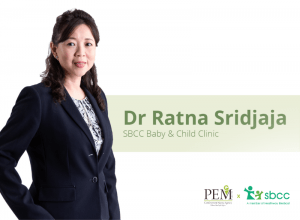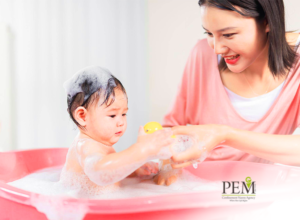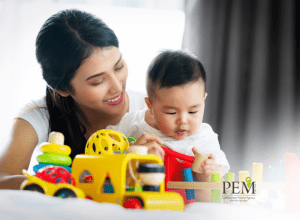[email protected] ♦ (+65) 6293 9249 ♦ Mon - Sun : 10:00AM - 7:00PM
Paediatrician Shares: Common Baby Conditions and Vaccinations

Being a new mother entails not only a slew of new responsibilities but also a slew of worries and concerns. Truth be told, we get it. We all want the best for our children, and worrying is an unavoidable part of that goal.

Dr Ratna Sridjaja is an SBCC Paediatrician who specialises in General Paediatrics. She graduated magna cum laude from the University of Southern California before pursuing her medical degree at the Perelman School of Medicine (University of Pennsylvania) in 1995.
She currently treats and cares for children and conducts developmental assessments as well as health and wellness screenings on them.
So, in the hopes of providing some much-needed relief to worried new mothers, we talked to Dr Ratna Sridjaja, SBCC paediatrician, who shared her expert opinions and tips on the two main topics that most new mothers are concerned about – common baby conditions and vaccinations!
Common Baby Conditions
Q: What are some of the most common baby conditions you encounter in your line of work?
Answer:
Neonatal jaundice (NNJ). This is a fairly common problem that occurs in babies when their livers are not mature enough to eliminate the yellowish chemical compound known as bilirubin from their blood, resulting in excess.
Another common condition in babies is rashes such as erythema toxicum neonatorum (ETN), diaper rash, and cradle cap. ETN is a skin condition characterised by blotchy red rashes with small fluid-filled bumps. Despite looking like pus, there is actually no infection. Then there’s diaper rash, which can occur as a result of wearing wet or soiled diapers for an extended period of time or allergic reactions to the dyes used in disposable diapers. Cradle cap, on the other hand, can be seen on a baby’s scalp and is most likely caused by excessive oil production by the sebaceous glands (oil-producing glands attached to hair follicles).
Vomiting and colic are also quite common in babies.
Q: How can parents treat each of these common conditions in their babies?
Answer:
NNJ normally clears up within 2 to 3 weeks of birth as long as the baby is well hydrated. However, if it lasts longer than three weeks, it may be a symptom of an underlying condition, and parents should consult with their baby’s paediatrician.
As for ETN, there is no need for treatment because it does not cause symptoms and goes away on its own. Diaper rash can be treated by changing a baby’s diaper frequently and using a good diaper rash cream containing zinc oxide and moisturisers. In the case of cradle cap, parents can apply baby oil to their baby’s scalp overnight and wash his or her hair the next day to remove the scales on the scalp.
When it comes to vomiting, parents can prevent it by burping their babies during and after feedings. If possible, avoid feeding your infant while he or she is lying down. When bottle-feeding, make sure to hold the bottle at an angle so that the nipple is always filled with milk and not air. The hole in the nipple should also be the correct size.
The exact cause of colic is unknown, but some theories suggest that it could be due to gas. Therefore, it should normally subside by the time the baby is 3 months old.
Q: What advice/tips do you usually give to parents who are unable to console their crying (possibly colic) babies?
Answer:
Try taking a walk with their babies or sit in a rocking chair and try out different positions. Parents could also swaddle or place their babies on their stomachs across their laps and rub their backs. Alternatively, they could put their baby in a swing, vibrating seat, or infant car seat.
Another great tip our PEM nannies have found from their extensive experience is to play music tapes, white noises, or even sounds like a running clothes dryer and vacuum cleaner as some babies find low constant noises soothing.
Q: How can parents protect their babies from viral infections, especially if they have to send them to Child or Infant Care Centres (IFC)?
Answer:
It is nearly impossible to prevent babies from contracting viruses and infections, but parents can certainly try to prevent it by keeping their baby’s immune system in good shape by ensuring that their little one eats a well-balanced diet and gets plenty of rest. It is also very important for parents to keep their baby’s immunisations up to date to prevent the contraction of contagious viruses such as measles, mumps, rubella, and chickenpox (varicella).
SBCC Child Development Centre
Vaccinations for Mothers and Babies
Q: Is it safe for new mothers to breastfeed after receiving the COVID-19 vaccine?
Answer:
New mothers should continue to breastfeed their babies throughout their COVID-19 vaccination process.
Q: How safe is it for parents to handle newborns after they have received the vaccine, especially if they experience side effects like fever?
Answer:
It is safe for parents to handle newborns after receiving their COVID-19 vaccines unless they are feeling weak.
Q: Speaking about vaccines, is it true that people with weak immune systems should avoid handling babies who have just gotten their rotavirus vaccines?
Answer:
Yes, it is true. As the vaccine is administered orally, it is possible that a weaker form of the virus in the vaccine passes through the baby’s gut and gets picked up by whoever changes his or her diaper. This may not harm healthy people, but it may pose a risk to those with severely compromised immune systems, such as those undergoing chemotherapy.
As a precaution, anyone in close contact with recently vaccinated babies (such as a mom confinement nanny) should practise good personal hygiene for at least 2 weeks after vaccination, particularly when changing nappies.
Q: What is one piece of information that you would like parents to know about vaccinations in general?
Answer:
Vaccinations are safe and can protect your baby from serious infections such as measles, pneumococcal pneumonia (a type of lung infection), chickenpox, pertussis (violent and rapid coughing), and meningitis (infection of the protective membranes that surround the brain and spinal cord).
While babies are born with protection against some diseases as their mothers pass antibodies to them before birth or after through breastfeeding, the protection is only temporary.
The Role of Paediatricians
Q: Taking all of this into consideration, how would you describe a paediatrician’s role in assisting parents from the time their baby is born?
Answer:
The arrival of a new baby brings about many changes in the lives of families, and as joyful as these times can be, they can also be challenging. As such, a paediatrician can assist parents with feeding challenges, sleepless nights, immunizations, developmental milestones, and other more specific childcare areas by providing the right guidance and expectations.
Healthway Medical App
SBCC (formerly known as Singapore Baby and Child Clinic) is a healthcare chain under Healthway Medical Group that focuses on the medical needs of children and women in Singapore.
Led by a team of specialists in paediatric care, child development, and women’s medical services, SBCC offers a variety of specialised care and guidance through in-person appointments, teleconsultations, and even home visitations.
Visit SBCC Website
PEM Confinement Nanny Agency
PEM Confinement Nanny Agency is Singapore’s leading and largest confinement nanny agency. We’ve been in the industry for over 30 years and have helped tens of thousands of mothers with hassle-free confinement nanny services.
We provide 24-hour baby care, laundry for both mother and baby, weekly housekeeping, and the preparation of confinement meals, herbal tonics, and baths, as well as breastfeeding and baby care tips and guidance to new mothers.
Visit our website right here to learn more about us and our confinement nanny services or to find a nanny Singapore!







